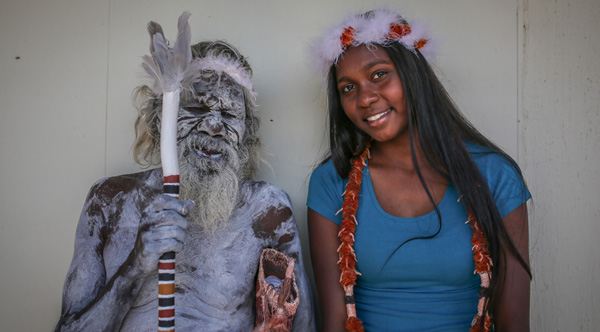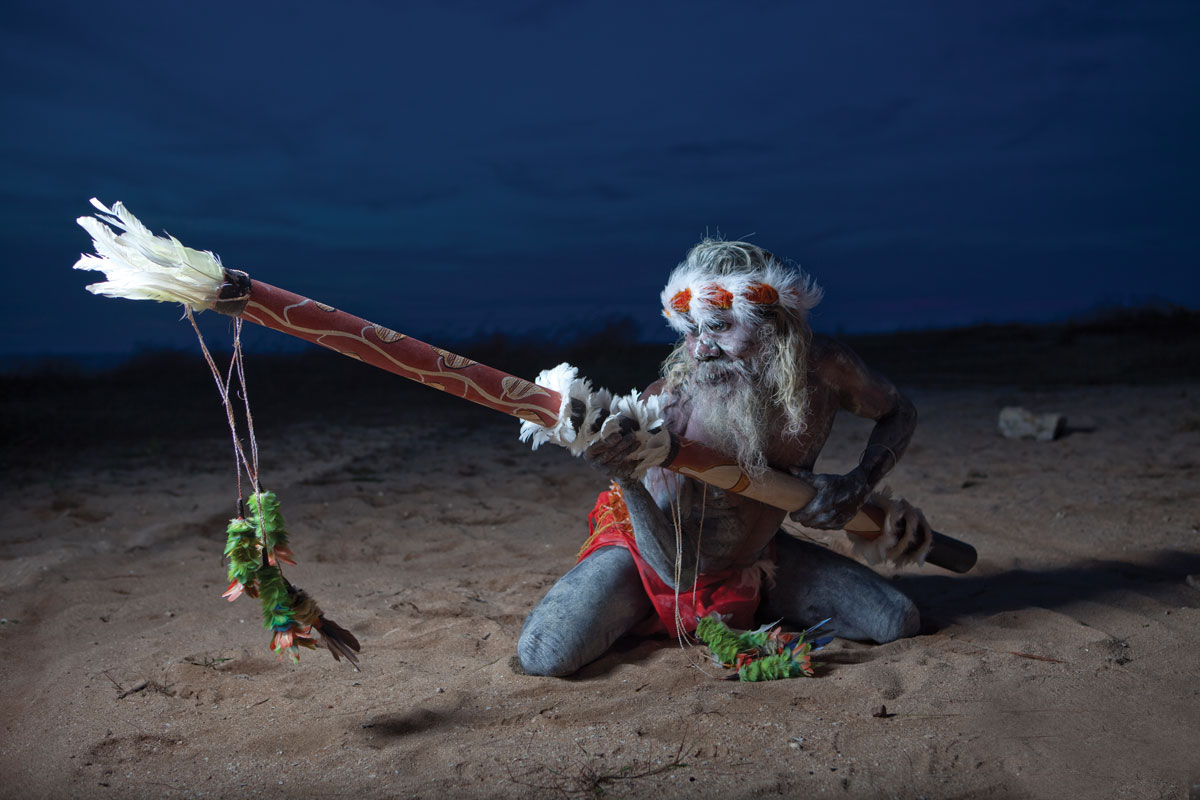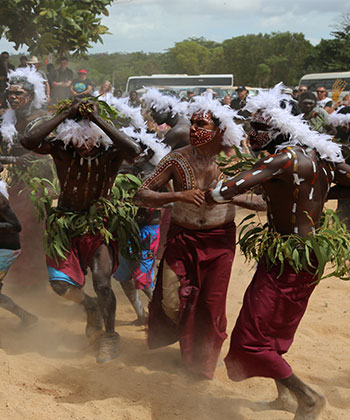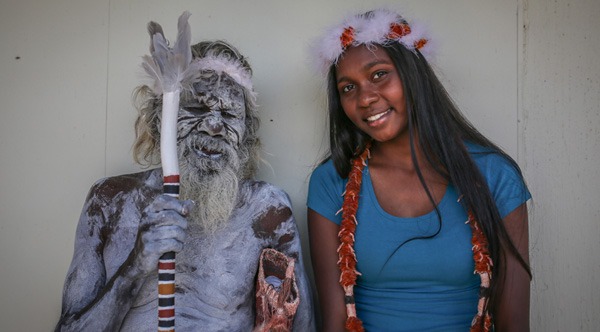In 2015, an Indigenous elder named Gali Yalkarriwuy Gurruwiwi embarked on a journey that would come to symbolize resilience, love, and cultural pride. Traveling over 2,000 miles (3,200 kilometers) from Galiwin’ku on Elcho Island to Melbourne, Australia, he went to witness a milestone that few in his community had achieved — the graduation of his beloved granddaughter, Sasha.
That day, Sasha became the first in her family to graduate from college, marking not only a personal victory but also a cultural breakthrough for her people. Her grandfather’s presence represented generations of strength and the enduring value of education as a pathway to empowerment.
A Journey Rooted in Love and Heritage
Gali Yalkarriwuy Gurruwiwi was a respected Yolngu elder, spiritual leader, and cultural educator from the remote Northern Territory community of Galiwin’ku. He was known across Australia for his deep knowledge of Yolngu law, ceremony, and art, and for his commitment to preserving Indigenous identity and language among younger generations.
When Sasha was accepted into Worawa Aboriginal College, an independent boarding school for Aboriginal young women in Healesville near Melbourne, it represented both opportunity and separation. The college — founded by Aunty Lois Peeler AM, one of Australia’s most prominent Indigenous educators — offers culturally grounded education that blends academic learning with respect for Indigenous values.
For many Aboriginal families, sending a child so far from home to pursue education requires great sacrifice. Yet for Gali, the decision symbolized hope: the hope that his granddaughter could walk confidently between two worlds — her Yolngu heritage and the modern Australian society — without losing herself.

The Long Road to Melbourne
Traveling from Elcho Island to Melbourne is no small feat. The journey spans thousands of kilometers across sea and land, involving multiple flights and long drives. For Gali, the trip was a profound act of love and devotion.
Despite his age and health challenges, he was determined to be there for his granddaughter’s graduation ceremony at Worawa College. His arrival, dressed proudly in traditional Yolngu attire, created an unforgettable scene — a visual and emotional bridge between ancient tradition and modern achievement.
When he finally reached Melbourne, he brought with him not just his presence but his people’s story — one that spoke of endurance, belonging, and pride. The moment when Gali stood beside Sasha, who wore her graduation gown and cap, captured the attention of everyone present. It became a living image of what reconciliation and progress truly mean.
Education as a Pathway to Empowerment
Across Australia, education outcomes for Indigenous students have long reflected structural inequality. According to data from the Australian Bureau of Statistics (ABS) and the Department of Education, Indigenous Australians remain less likely to complete secondary school or attend tertiary education compared with non-Indigenous students.
As of the mid-2010s, less than 5 percent of Aboriginal and Torres Strait Islander students enrolled in universities, and the rates of early school leaving were significantly higher in remote areas. However, initiatives like Worawa Aboriginal College and scholarships for Indigenous youth have begun to change this landscape.
For Sasha, her education represented more than a diploma. It was a reconnection to possibility, a chance to redefine her future and inspire others from her community to pursue learning.
Worawa College focuses on “walking in two worlds” — a philosophy that honors Indigenous identity while preparing students for modern professional life. It encourages self-esteem, leadership, and cultural pride alongside literacy, numeracy, and vocational skills. Through this approach, Sasha and her peers are empowered to see education as a tool of both liberation and preservation.

A Symbol That Moved a Nation
When the images of Gali and Sasha at the graduation ceremony were shared publicly, they touched hearts across Australia. For many, the sight of a Yolngu elder traveling thousands of kilometers to stand proudly beside his granddaughter symbolized more than family love.
It represented the enduring strength of Indigenous culture — one that continues to thrive despite centuries of displacement and adversity. It also highlighted the importance of intergenerational connection, showing that true education honors the past as much as it prepares for the future.
Media outlets and educational organizations quickly shared the story, calling it a powerful example of what can be achieved when communities invest in young Indigenous women. Many educators cited it as an example of how family, culture, and education must work together to create lasting change.
Preserving the Yolngu Spirit
Gali Yalkarriwuy Gurruwiwi’s influence extended far beyond that single day. He was a djungaya (ceremonial manager) and a key figure in teaching the sacred Banumbirr, or Morning Star Ceremony, one of the most important spiritual traditions in Yolngu culture.
Through his work, Gali helped preserve cultural knowledge for future generations, collaborating with artists, musicians, and anthropologists to ensure that Yolngu stories and spiritual practices remained vibrant. His teachings about the Morning Star — a symbol of light, hope, and connection — mirrored the essence of his journey to Melbourne: guiding younger generations toward a brighter path while staying anchored in tradition.

The Power of Representation
Representation matters, especially for Indigenous youth who often grow up without seeing their stories reflected in mainstream education or media. For Sasha, standing beside her grandfather on graduation day wasn’t just a moment of family pride — it was a declaration of identity.
She showed that being educated doesn’t mean leaving culture behind. Instead, it can be an act of honoring one’s ancestors by carrying their wisdom into new spaces. Her success became a beacon for young Aboriginal girls across Australia, proving that education and culture can coexist beautifully.
In classrooms, community gatherings, and educational forums, Gali and Sasha’s story has since been shared as an example of what happens when communities believe in their youth — and when those youth are supported to walk confidently in both worlds.
Bridging Two Worlds Through Education
Worawa Aboriginal College continues to nurture this philosophy. Its programs include traditional dance, art, and storytelling alongside mainstream academic subjects. Students learn from elders as well as teachers, integrating cultural wisdom with formal education.
This model of education — sometimes called “two-way learning” — has been recognized by the Australian Human Rights Commission and the National Indigenous Australians Agency (NIAA) as a pathway toward closing the education gap.
By valuing both worlds equally, schools like Worawa empower students to see their Indigenous identity as a strength, not a barrier. That empowerment is precisely what Gali envisioned when he undertook his 2,000-mile journey.

A Legacy That Endures
Gali Yalkarriwuy Gurruwiwi passed away in 2020, but his legacy lives on in the lives he touched. His journey to Melbourne remains one of the most poignant illustrations of family devotion and cultural pride in modern Australian history.
Through Sasha’s achievement and Gali’s example, the story continues to inspire conversations about reconciliation, equity, and the power of education to heal generational wounds. It reminds us that true progress is not just measured in statistics or diplomas but in the human connections that bridge time and distance.
Why Stories Like This Matter
In an age dominated by technology and global information, personal stories like Gali and Sasha’s help re-center our understanding of what truly matters. They show that education, when rooted in love and respect for heritage, has the power to transform entire communities.
For many Indigenous Australians, education is not simply a means to an end; it is an act of reclamation — reclaiming history, culture, and voice. Gali’s long journey was, in every sense, a spiritual act of resistance against the forces that once sought to silence Indigenous culture.
Each new graduate who follows Sasha’s path continues that resistance — walking the same spiritual road, guided by ancestors who believed in the light of knowledge.
Conclusion
Gali Yalkarriwuy Gurruwiwi’s 2,000-mile journey to witness his granddaughter’s graduation is more than a touching family story — it is a testament to the enduring power of education, culture, and intergenerational love.
It reminds us that the path toward reconciliation and equality begins not only in classrooms or policies but in the hearts of families who never stop believing in one another.
That day in Melbourne, when an elder stood beside a young graduate, two worlds met — and both were made stronger.
Sources
-
Worawa Aboriginal College Official Website – worawa.vic.edu.au
-
Australian Bureau of Statistics (ABS): Education and Work Reports
-
Australian Department of Education – Indigenous Education Statistics
-
National Indigenous Australians Agency (NIAA): Closing the Gap Data Reports
-
Australian Human Rights Commission: Indigenous Education and Cultural Identity Frameworks

